On September 18, grad student Kelsey Moore presented at the Caring for Those Who Care:The 2018 Saskatchewan SPCA Conference in Saskatoon.

On September 18, grad student Kelsey Moore presented at the Caring for Those Who Care:The 2018 Saskatchewan SPCA Conference in Saskatoon.

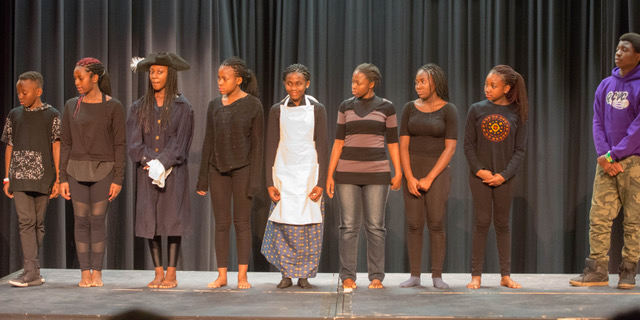
The play Once a Flame by Beau Dixon, was produced by the Saskatchewan African-Canadian Heritage Museum (SACHM) and the African-Canadian Resource Network (ACRN) as part of the Canada 150 Celebrations, in order to ensure that the history of Black African-Canadians were included in the discussion. Once a Flame follows the 1734 trial of the slave Marie-Josèphe Angélique, who was accused of burning down 1/3 of Montreal. The play was also produced in order to give youth involved with the SACHM and ACRN an opportunity to perform and learn about theatre and history. Alumnus Dr. Thomas Jing, Teacher Julius Sendze, and the Faculty of Education’s Assistant Professor Dr. Sara Schroeter co-directed the play.
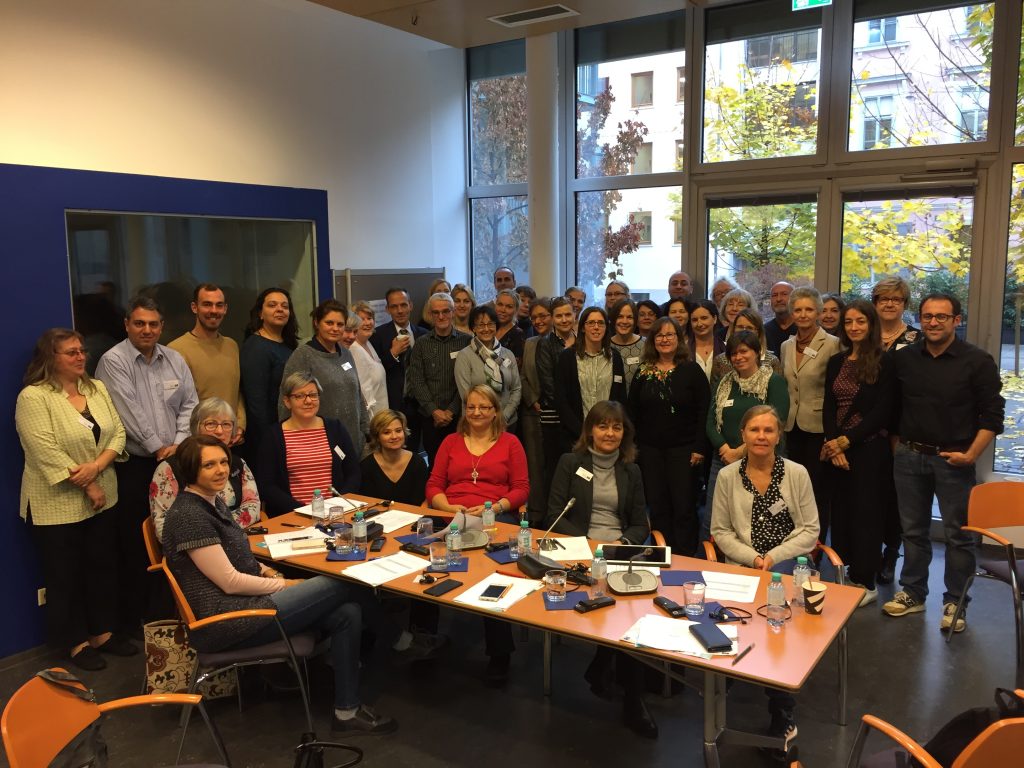
Programme du baccalauréat en éducation faculty member Dr. Joël Thibeault was selected by the European Centre for Modern Languages (ECML) as a representative of Canada and the University of Ottawa’s Official Languages and Bilingualism Institute to take part in think tank discussions for developing language awareness in subject classes, within the ECML’s “Languages at the heart of learning” programme 2016-2019. The gathering, held November 16-17, was located in Graz, Austria.
Q & A with Dr. Joël Thibeault
The ECML views language education as key in responding to linguistic and cultural diversity, in achieving intercultural dialogue, democratic citizenship, and social cohesion.
What was the specific focus of the discussions you were part of?
Through this think tank, the ECLM gathered an array of educational professionals – professors, teachers, and policy makers – to engage in discussions on the inclusion of linguistic content in different school subjects. The goal of this initiative is to provide practical procedures that will help teachers in the identification of their students’ needs in different subjects and to provide examples of scaffolded materials which, based upon the learner’s language awareness, will address their needs in different disciplines at school.
In what ways is the University of Regina, Faculty of Education, (Bac programme) working to address/redress the issue of quality language education?
The Bac program aims at offering a quality education to future teachers, most of whom will teach in French immersion. As such, in their career, these teachers will not only have to worry about teaching their subject (mathematics, history, etc.), but also they will have to do so in their learners’ second language. Therefore, future teachers must consider the linguistic structures through which content is taught and, if need be, help students develop the linguistic knowledge they will need to construct new competencies in these disciplines. Of course, every teacher, whether in immersion or not, should always worry about language in the teaching of a non-linguistic discipline. However, this focus on language should probably be more present when the language of schooling is the learner’s second language. The Bac program, therefore, puts a lot of emphasis of articulating content and language, and my participation at the ECML’s workshop will help us expand on this topic.
Does this opportunity promote international connections and research?
This was probably the best part of this workshop; I got to meet more than 30 educational experts who came from all across Europe. It was also great that ECML invited people in academia, such as myself, but also invited teachers and decision makers. Everybody came with their own perspective, which contributed to rich discussions and group work.
What was the value of this experience for yourself, for Canada, and for the field of study?
Academics have been talking about the integration of language and content for many years now, but there seems to be a lack in concrete resources for teachers. I think that by bringing different perspectives together the ECML will be able to provide a wide variety of resources which, on the one hand, will be based on the most recent research on the topic and, on the other, will rely on the heterogeneity of expertise that was gathered during the workshop.
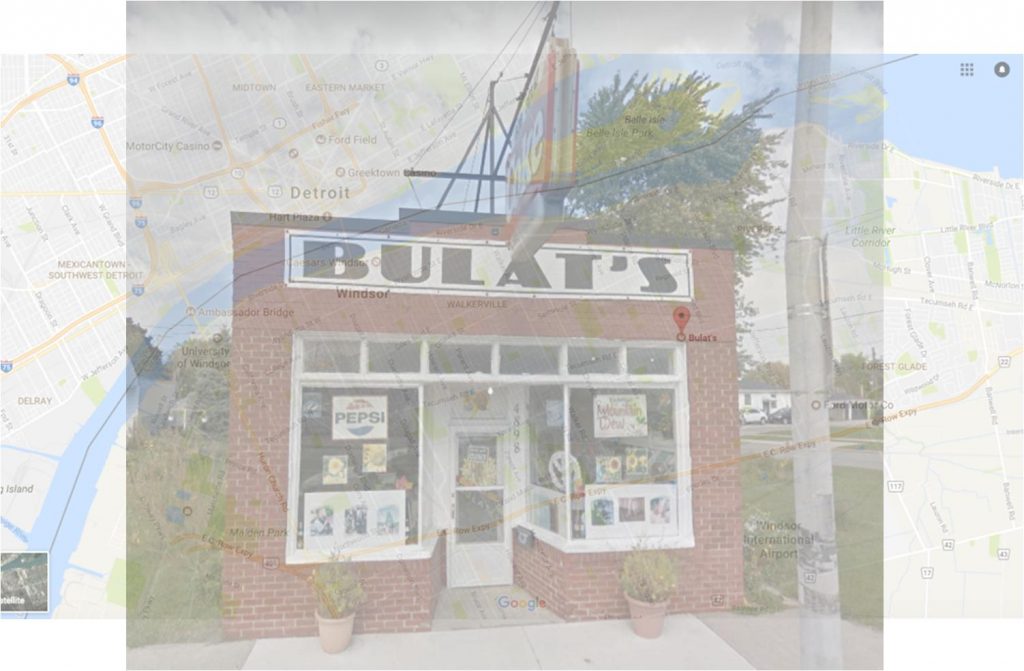 The stories of Windsor through carto elicitation exhibit
The stories of Windsor through carto elicitation exhibitTerry Sefton and Kathryn Ricketts
October 21, 2017 – January 28, 2018
The Art Gallery of Windsor
This project investigates experimental spaces with dance/music/story/place.
Terry Sefton from Windsor (cellist) and Kathryn Ricketts from Regina (dancer) have been experimenting through residencies in the Listening Lab at the University of Regina with a term we are calling “carto-elicitation.”
We propose these stories are underpinned by specificity of place and plan to extend the artefact provocation of Anthropology of the Discard with cartographic elicitations to test if this is true.
We will request that the participants of this exhibition target a place that holds a potent memory, perhaps the first time or the last time something happened. Maps are provided in the gallery space where brief poetics are combined with cartographic identifiers. This is combined with an online mapping which captures the mapped and verbal stories and this collective map is projected with sound files of the stories running throughout the visiting hours of the exhibition. This virtual addition to the exhibition will be facilitated by an app that can be easily accessed on or off site.
Finally, Kathryn and Terry will perform the Windsor Stories live with live cello and dance/theatre improvisations based on the improvisations systems they have defined throughout their residencies together. This work together will be an unfolding narrative of the stories that linger in the place of Windsor.
This work is part of an upcoming exhibition at the Windsor Art Gallery titled Downtown/s Urban Renewal: Today for Tomorrow, the 2017Art Gallery of Windsor’s Triennial of Contemporary Art.
The exhibit runs form October 21, 2017 – January 28, 2018 and will accumulate public stories of Windsor through video and performances over this period.
For more information please contact
Kathryn Ricketts at 604-788-4022 or rickettk@uregina.ca
Bios:
Terry Sefton began playing professionally with the Regina Symphony while still in her teens, and worked with the BBC Welsh Orchestra, the Canadian Opera Company, and Orchestra London Canada for over 30 years. She has performed as a chamber musician in Canada, the US, Britain, and France. Over many years, she has worked with contemporary composers, developing and performing new works, at a number of new music venues including Concerts de Musique Contemporaine in Montreal, the Music Gallery in Toronto, and Aeolian Hall and Museum London in London, Ontario, and the Listening Lab in Regina, Saskatchewan. Terry most recently commissioned new works by composers Martin Kutnowski (St. Thomas University, 2016) and Bentley Jarvis (Ontario College of Art and Design University, 2015), and developed improvised performances of carto-elicitation with Kathryn Ricketts (University of Regina, 2016; University of Windsor, 2017). Terry Sefton holds a Bachelor of Music in Performance from McGill University, a Master of Education from University of Western Ontario, and a PhD from University of Toronto. Dr. Sefton is Associate Professor at the University of Windsor.
Kathryn Ricketts has been working for the past 35 years in the field of movement, theatre and visual arts, presenting throughout Europe, South America, Africa and Canada. Her work in schools, galleries and community centers focuses on social /political issues with movement, theatre, creative writing and visual art as the languages. Her Doctoral research furthered this into areas of literacy, embodiment and cultural studies with a method she has coined Embodied Poetic Narrative. She is an Assistant Professor in the Faculty of Education in the University of Regina as the chair of the Dance area. She runs The Listening Lab, a visual and performing arts ‘incubator’ and presents exhibitions and performances in her loft in the John Deere Tractor Building.
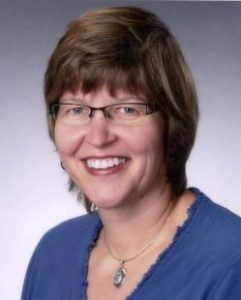 Congratulations to Dr. Cindy Hanson for receiving funding in the amount of $2000 from the Community Connections series for Congress 2018 for her project is called “Learning from Labour: Experiments in equity and learning from Turtle Island.” The committee indicated that Cindy’s event would be an excellent addition to the Congress 2018 program.
Congratulations to Dr. Cindy Hanson for receiving funding in the amount of $2000 from the Community Connections series for Congress 2018 for her project is called “Learning from Labour: Experiments in equity and learning from Turtle Island.” The committee indicated that Cindy’s event would be an excellent addition to the Congress 2018 program.
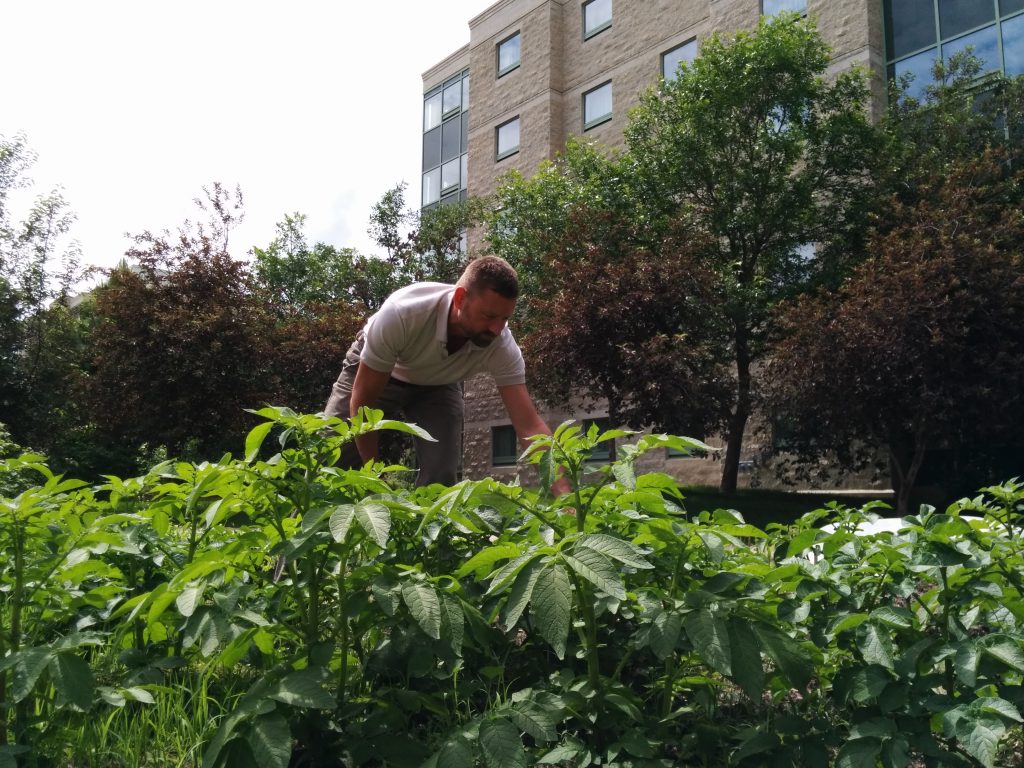
In spring 2017, The Faculty of Education’s Indigenous Family Therapies Class (EPSY 870AB) in partnership with the Indigenous Peoples’ Health Research Centre (IPHRC) have planted a Project of Heart Reconciliation Garden.
The Objectives of this project in our class were:
• To present a culturally-competent counseling intervention by integrating Indigenous knowledge within the more modern ecopsychology approach;
• To encourage a three-way therapeutic alliance between counselor, client, and nature as co-therapist;
• To deconstruct the modern therapeutic “space” by promoting nature-based therapeutic interventions; and
• To identify gardening as a social justice approach.
We based our garden design around the Honouring Memories Planting Dreams
Celebrated in May and June, Honouring Memories, Planting Dreams invites individuals and organizations to join in reconciliation by planting heart gardens in their communities. Heart gardens honour residential school survivors and their families, as well as the legacy of the Truth and Reconciliation Commission of Canada. Each heart represents the memory of a child lost to the residential school system, and the act of planting represents that individual’s commitment to finding their place in reconciliation. In 2016, more than 6500 hearts were planted in gardens across Canada.
JoLee Sasakamoose – JoLee.Sasakamoose@uregina.ca
John Klein – John.Klein@uregina.ca
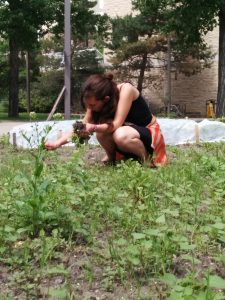
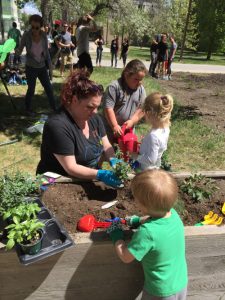
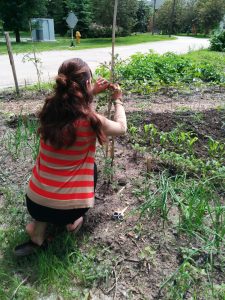
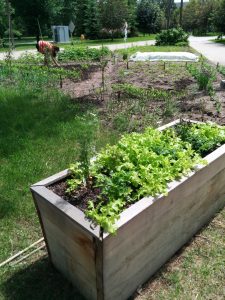
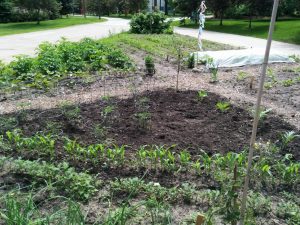
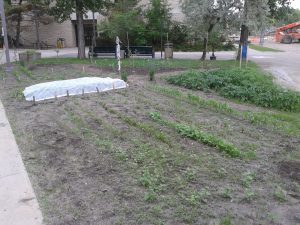 Reposting from https://reginaediblecampus.wordpress.com/le-potager/
Reposting from https://reginaediblecampus.wordpress.com/le-potager/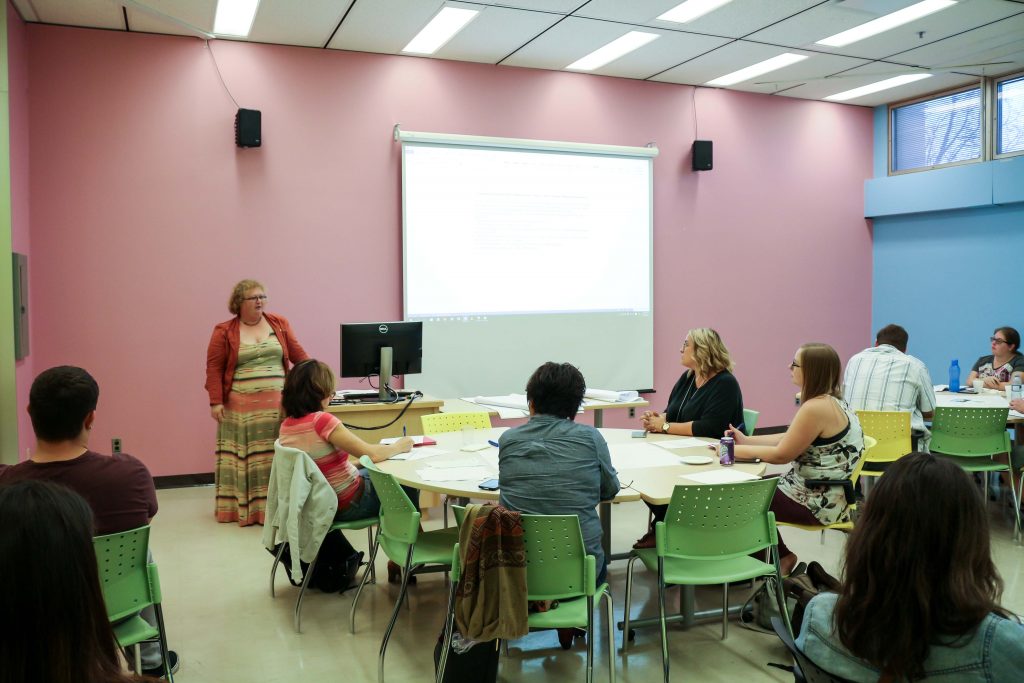
In late December of 2016, Dr. Gale Russell was invited by the Student Achievement Support Unit within the Manitoba Ministry of Education to attend their second Mamtowisiwin session that was focused on supporting the achievement of Aboriginal students in the area of numeracy. By the end of an hour-long conversation with members of the unit, the invitation had extended from presenting on the first day of the two-day event, to offering a two-day workshop.
Gale accepted and presented a workshop on February 8 and 9, 2017. In attendance were over 140 school division directors, mathematics consultants/superintendents, Aboriginal consultants/superintendents, Manitoba Ministry of Education personnel, principals, vice principals, teachers, and preservice teachers.
Gale says, “It was a great two days, filled with lots of exploration and discussion of diverse, yet interconnected topics including: mathematics – what it is, what it could be, and what it should be; the Traditional Western and an Indigenous worldview, supporting Aboriginal students in mathematics, supporting all students in mathematics, and how to ‘deal with’ systemic factors beyond their control (such as standardized testing and grading policies. It was a time of seriousness, laughter, and even tears. And, everyone did their homework – both reading articles and counting squares. It was also a great pleasure to meet and work with the invited Elder for the two days, Florence Paynter, a retired educator and scholar, who shared many stories and much wisdom with the group.”
Since the workshop, Gale has been regularly receiving emails from attendees with specific and general questions, as well as an invitation to come and spend the day with the Manitoba Association of Mathematics Teachers on their PD day in October. Gale says, “I have happily accepted the invitation, and look forward to yet another experience of deep insights, thought-provoking discussions, and lessons to be learned, challenged, and unlearned.”
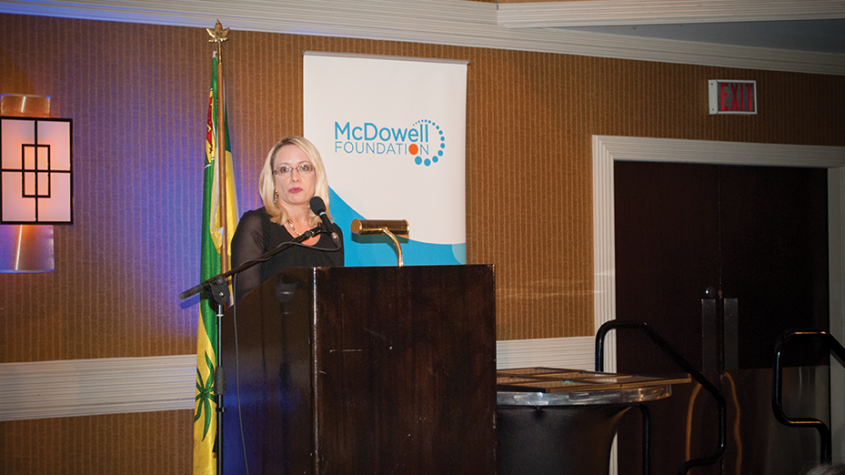
In her keynote address to the McDowell Foundation’s 25th anniversary gala, Jennifer Tupper, dean of the Faculty of Education at the University of Regina, told those in attendance that the work of the McDowell Foundation, and its support for teacher inquiry and research, is more important than ever.
Tupper expressed her grave concerns for PreK-12 education in Saskatchewan and elsewhere, citing political, social and economic times that leave us with much uncertainty when it comes to the current educational landscape in the province.
“There is less government support for publicly funded education, less respect and support for the important work of teachers, and increasingly complex and diverse classroom realities that teachers must negotiate in good ways every day with fewer resources at their disposal,” Tupper suggested.
While pledging her deep respect for “each one of you in this room for the contributions you are making to the lives of children and youth in the province,” Tupper drew on her personal experience as a McDowell researcher.
“Since 1991 when it was formed, the McDowell Foundation has supported an amazing legacy of teacher-led research with real, immediate and lasting educational effects by funding almost 300 projects.”
According to Tupper, “if we believe, as educators, that our role is to teach for a better world, then the McDowell Foundation is an important avenue of support for this work which can be, as you all know because you live it, very challenging, emotional, frustrating, but that can also be tremendously rewarding and indeed transformational.”
As an academic herself, Tupper shared how research projects at universities can be a painstakingly slow and circuitous process while clinging to the hope that others will ultimately read the published articles at the culmination of the research.
“Sometimes, the time between finishing our research and publishing is up to five years. Sometimes it is years before we have evidence that our research has been taken up by other academics in other universities around the world,” Tupper shared.
Against that backdrop Tupper said it was her aim to highlight the real and immediate value of the teacher-led research funded by the McDowell Foundation.
“This organization, which is relatively unique in Canada, is one that we must all value, support, and continue to advocate for now and in the future, and especially because these are such precarious times.
“The McDowell Foundation is about research that has an impact. Your commitment to transforming Saskatchewan classrooms and teaching for a better world is where hope resides in this post-truth and precarious world we find ourselves in. Together we are stronger.”
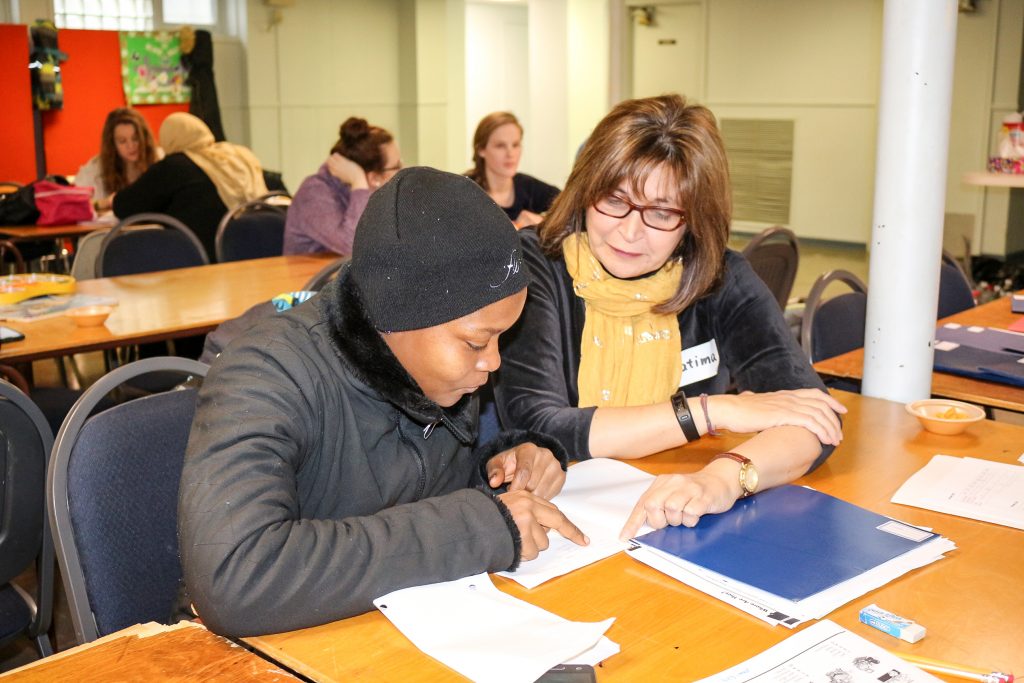
ELNG 200 students are volunteering in a community-based language program for new Canadian women with infants and preschool-aged children. The program was developed by the Faculty of Education’s Dr. Fatima Pirbhai-Illich and Professor Emeritus Dr. Meredith Cherland in partnership with the Saskatchewan Synod of the Evangelical Lutheran Church in Canada (ELCIC).
ELNG 200 is a second-year Faculty of Education course that prepares future teachers to support students learning to speak, read, and write the English language. As part of the course requirements, students must be involved in 8-10 hours of critical service volunteering. However, with approximately 30 students per course looking to fulfil their volunteer requirements in teaching English as an additional language (EAL), this requirement can pose a difficulty. Dr. Fatima Pirbhai-Illich, who teaches the course, says, “Sometimes students are left scrambling.” Thus, she began looking for new venues where her students could volunteer.
Dr. Pirbhai-Illich approached a colleague, Professor Emeritus Dr. Meredith Cherland, about the needs of her students. Dr. Cherland, who is chair of the Welcoming the Newcomer Committee for her church, Our Savior’s Lutheran Church in Regina, had been working with the committee, filling out federal forms of application for sponsoring a Syrian family of six. The committee was aware that the process would take several more months and they were asking themselves what to do in the meantime.
Meredith had met 18-year-old Finda Sam, her husband Amos Kamato, and their baby boy at church. Meredith says, “The couple had spent many years of their young lives in a refugee camp in Guinea, although they were born in Sierra Leone. Their first language is Kisi, an African language I had never heard of.” Finda had approached Meredith, asking if she could help her to learn to speak English better, and to learn to read and write English. Finda was waiting for a childcare opening before she could begin English classes at the Open Door Society. “The classes at Open Door and the Library have a limited number of spaces and there are wait lists,” says Meredith.
With Finda’s situation in mind, Meredith and Fatima started thinking about the many new Canadian women in Regina who could not attend EAL classes because they had babies or preschoolers to care for. They began working to set up a community-based language program for newcomers to Canada, specifically those who are on waiting lists for language classes through the Open Door Society, the Regina Public Library, and the Regina Immigrant Women’s Centre. Fatima with her extensive EAL background was willing to teach a language and literacy class for newcomer women with babies or preschoolers on Tuesday and Friday mornings. This would also give her U of R ELNG 200 students opportunities for volunteering.
Thus resolved, Fatima and Meredith began looking for a space, and were at first discouraged because they had no budget. Meredith, then, applied to the Saskatchewan Synod of the Evangelical Lutheran Church in Canada (ELCIC) for funding. The ELCIC awarded them $1,100.
Central Lutheran Church offered them space without charge. “This is the most important part,” says Fatima, “It’s amazing, and we wouldn’t have been able to offer the program without it.”
The funding, then, would cover tea, juice, and snacks for the students and their children and the services of a coordinator. Cynthia Schultz, a University of Regina master’s student in the Faculty of Education, was hired as the coordinator.
With a space, a teacher, a coordinator and volunteers in place, they advertised the course at the Open Door Society, the Regina Public Library and the Lutheran churches in Regina. The first class was offered on October 4.
Coordinator Cynthia Schultz says, “So far, we have only held five classes, but we have had 11 women attend, with nine attending regularly, and about nine children under the age of five attending. Around seven students from Fatima’s class [ELNG 200] come on Tuesday mornings and nine on Fridays.”
Others from the Faculty are also involved. Dr. Christine Massing helps with the children on Tuesdays. The students from ELNG 200 and students from Fatima’s master’s classes have taken this opportunity to donate items such as diapers and clothing for the EAL students to take home. Yan Yang, a PhD student, also comes out to help tutor each week.
Some women from the Lutheran Church are also volunteering, helping with set up and bringing homemade halal snacks once per week. Bernice Casper, a volunteer from Our Savior’s Lutheran Church, says, “I think this is so wonderful for new Canadians to have this opportunity to learn English one-on-one—it’s one-on-one—that’s what I want to emphasize about this program. I also love the interactions between the U of R students and the English students.”
Fatima prepares all the course material after assessing where EAL students are at with their English. She also assists her ELNG 200 student volunteers with strategies for teaching EAL. The Regina Public Library has helped with curriculum.
EAL student Rasha has been attending the program for one month and says she likes it; “I’m learning many words,” she says. She is finding new friends through the program; “We help each other with English.”
University of Regina student Jenna Magnusson works with Rasha as her EAL tutor. Jenna says, “This has been a good experience. I’m gaining insights about people learning English.” One of her strategies is to use her Google translator to look up a word in Arabic when her student gets stuck on a word.
EAL student Finda Sam works with U of R student Jonah Norman-Gray. Finda also likes the program and says she is learning. She says, “I want to learn to read, to read and write.” She would also like to learn to drive. Once these skills are in place, she will consider what she would like to do in the future.
What has volunteering taught him? Jonah says, “Awkwardness [when teaching EAL] is not a problem. Situations where you are not sure what to say are normal. Awkwardness just means you care about the situation.” Working as a volunteer in this program is important to Jonah because, he says, “I will be using this [experience] in the future–I think it is very important work.” Jonah adds, “It is good to see this kind of program show up in a grass-roots scenario. This is beautiful–it is the goodness of people.”
Miriam, a mother of four, has also found the program helpful. She says, “Everyone helps me learn English.” She has also found new friendships through the program. U of R students Taylor Raby and Darian Kaszas work together with Miriam using a picture dictionary. Speaking to the value of this experience, Darian says the program “will help a lot for future educators. We are bound to have students who don’t speak English,” and Taylor adds, “or students who are trying to learn another language.” Taylor says she has learned that when teaching EAL, “it really helps if you go slowly and repeat a lot.”
Cynthia Schultz focuses on the value of this program for the EAL students. She says, “For me, I see the importance of these classes for the women who attend. They are no longer at home all day by themselves or only with their young children. They come to us for four hours per week, they get to socialize with other women, and of course, they learn a variety of English language and literacy skills. On the first day, everyone was shy, but now they come in and you can see that they are excited to be here…I have noticed their language skills becoming much stronger and it is wonderful to see.”
For the future, Fatima is interested in making this program a self-sustaining model: She says, “It is for community from community.” She is hoping to interest retired teachers in the program, and more student volunteers.
Meredith says, “Things have been going well, and we will try to continue as long as there is a need. The Faculty of Education and its students are truly in partnership with the ELCIC on this project. The church is providing space to meet, funds to keep us going, and people to help. The Faculty is providing a teacher, and students to provide one-on-one tutoring, practice with English, and friendship. The project is only one thing our church is doing to help refugees, and only one thing the Faculty of Education is doing to respond to the world around us and its educational needs. It seems to me that God is calling us all to contribute. There are, after all, 21 million refugees in the world today, according to the United Nations.”
To see photo gallery, slide your cursor over the photo below and click on the arrow to see the next photo.